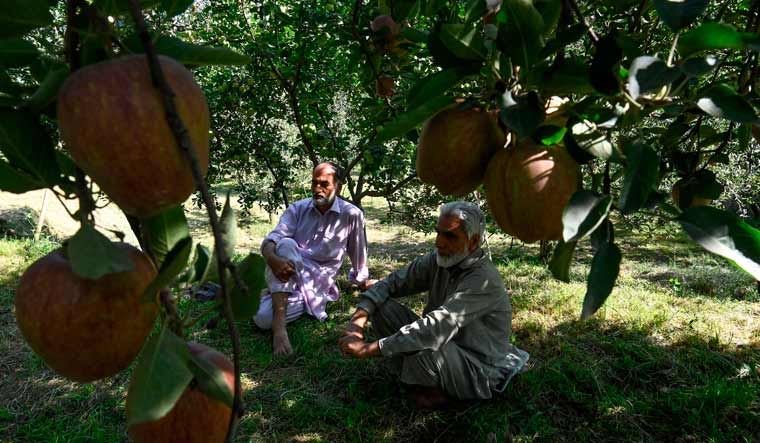
In 2018-19, according to government estimates, fruit harvests from Jammu and Kashmir will come around 1,956,331 metric tonnes, similar to the 1,973,326 mt recorded in 2017-2018, reported Firstpost. Moreover, the publication claimed, the bulk of production came from the districts of Shopian, Anantnag and Baramulla, all hotbeds of separatism in which economic anxiety could play a part.
It is no surprise, then, that the emerging militancy uses the widespread apple cultivation in the valley as a target against India. After the abrogation of Article 370, terrorists had threatened apple growers not to sell their produce in the market. Three people—including a Rajasthani truck driver, a migrant worker from Chhattisgarh and an apple trader from Punjab—were murdered by militants, and an apple truck was set on fire, leading to fears that the crop trade would come to a standstill.
About 75 per cent of apple that India exports is grown in Kashmir. The Rs 8,000 crore business supports 33 lakh people, which is 47 per cent of the population in Kashmir. This include seven lakh growers and their families, transporters, packagers, fertiliser and chemical sellers, commission agents, retail fruit sellers, and labourers who work in apple orchards.
The impact of the clampdown and communication blockade is so telling on the apple industry that compared to 1,100 trucks that used to leave the market every day after the beginning of of the harvest season in September to different parts of India have been reduced to a trickle—30 to 40 trucks a day—by the beginning of October.
On Wednesday, Kashmir apples with messages like 'We want freedom', 'I luv Burhan Wani' and 'Zakir Musa come back' written on them were found in boxes bought by fruit sellers in Jammu and Kashmir's Kathua district, prompting boycott calls and a police probe into the matter. Fruit sellers on Wednesday threatened to boycott apples from Kashmir if the government fails to take action as people are refusing to purchase them due to these messages.
Led by president of Kathua wholesale market Rohit Gupta, fruit sellers held protests and raised anti-Pakistan and anti-terrorist slogans. "The boxes were from Kashmir and the messages were written in English and Urdu," Gupta said. The apples also had messages like 'Go back India-Go back India', 'Mere Jaan Imran Khan' and 'Pakistan-Pakistan'.
On Wednesday, a Punjab-based apple trader was killed and another injured in a militant attack in Shopian district. Charanjeet Singh and Sanjeev were shot at Trenz by 3-4 militants around 7.30pm, police said. They were taken to the district hospital in Pulwama in a critical condition. Charanjeet succumbed to his injuries while Sanjeev's condition is stated to be critical, they said. On the same day, a migrant labourer from Chhattisgarh was shot dead by terrorists in militant-infested Pulwama district of south Kashmir. Sethi Kumar Sagar, a resident of Besoli area of Chhattisgarh, was a brick kiln worker. He was killed by terrorists when he was walking with another civilian near Kakpora railway station.
This is the second incident of targeting non-Kashmiri workers in the valley since Monday. Two terrorists, including a suspected Pakistani national, shot dead a truck driver from Rajasthan, Sharief Khan, at Shirmal village of Shopian district in south Kashmir on Monday. The same day, miscreants also set ablaze a truck carrying apples in Shopian district of Jammu and Kashmir, police said. The truck, bearing a Rajasthan-registration number, was set ablaze on its way to Jammu. A body was reportedly found from the vehicle.
Reportedly gollowing diktats of the Pakistan-based handlers to disrupt the trading of fruits, two militants had, in September, attacked family members of a prominent fruit merchant in Sopore, injuring his 25-year-old son and two-and-a-half-year-old granddaughter.
In a bid to circumvent economic insecurity of cultivators, the Centre had created a plan for apples cultivated in Jammu and Kashmir to be procured directly from farmers by the government-run NAFED. The objective of the National Agricultural Cooperative Marketing Federation of India Ltd (NAFED) is to promote co-operative marketing of agricultural produce to benefit farmers. The procurement will be made directly from genuine apple growers and the state administration will ensure direct payment in bank accounts of apple growers through direct benefit transfer (DBT). All categories of apples would be procured from all the apple producing districts in Jammu and Kashmir as well as designated mandis (wholesale markets) in Sopore, Shopian and Srinagar.

No comments:
Post a Comment